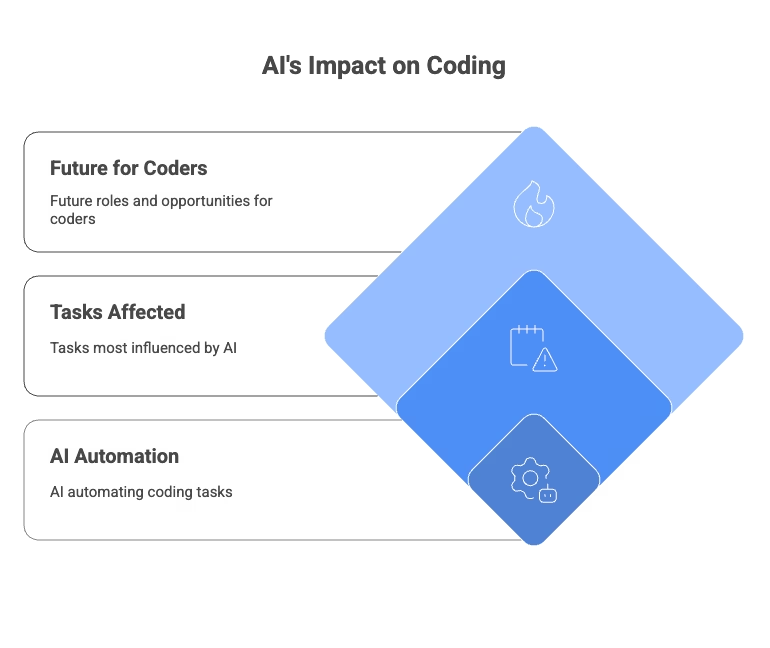Will AI Replace Coders?
What Does “Will AI Replace Coders?” Really Mean?
In 2025, the question “Will AI replace coders?” is everywhere. A lot of people are wondering if programmers will soon be out of a job because AI tools like GitHub Copilot, ChatGPT, and DeepMind’s AlphaCode can write lines of code in seconds.
This is the truth:
- AI can take care of boring coding tasks like boilerplate code, debugging, and simple functions.
- AI speeds up development by letting programmers spend less time writing simple code and more time solving hard problems.
- AI helps people who don’t know how to code make apps with “low-code” and “no-code” tools. Anyone can make prototypes on platforms that use AI.
But writing code isn’t the only part of coding. It’s about figuring out problems, coming up with systems, and making choices. AI is a good assistant, but human coders are more creative, logical, and responsible than AI can ever be.
In short, AI won’t take the place of coders, but coders who know how to use AI will take the place of those who don’t.

How “Will AI Replace Coders?” Works in Simple Terms
Imagine you’re baking a cake.
Without AI → You shop for ingredients, measure them, follow steps one by one.
With AI → It’s like having a smart assistant pre-measure, pre-mix, and even suggest better flavors. You still decide what kind of cake to bake.
This is exactly how AI works in coding:
You write a prompt → “Write a Python function that sorts a list of numbers.”
AI generates code → The function appears instantly.
You test & refine → You decide if the code is correct, secure, and efficient.
You design the system → AI doesn’t know why you’re building the app — you do.
So while AI can write parts of the program, the vision, creativity, and system design still belong to human coders.
Real-World Use Cases
Students → Use AI to debug assignments or learn new languages faster.
Professionals → Speed up repetitive tasks, auto-generate unit tests, or translate legacy code.
Startups → Rapidly build MVPs (minimum viable products) with AI-assisted coding.
Enterprises → Use AI in DevOps for monitoring, automation, and predictive
Will AI Replace Coders? The Truth in 2025
The Question Everyone Is Asking: An Introduction
Comparisons: AI vs Human Coders
| Aspect | AI Coders | Human Coders |
|---|---|---|
| Speed | Generates code instantly | Slower, but can think strategically |
| Creativity | Limited to patterns it has learned | Can innovate and create new solutions |
| Problem-Solving | Struggles with context or unclear requirements | Excellent at abstract, complex reasoning |
| Debugging | Good at spotting syntax errors | Better at understanding logical flaws |
| Accountability | Cannot take responsibility for outcomes | Humans ensure ethical, secure decisions |
Conclusion: AI accelerates coding, but humans provide the vision.
Case Studies: How AI Is Changing Coding
Case Study 1: GitHub Copilot
Context: Used by professional developers.
Impact: Cuts coding time by 20–40% on repetitive tasks.
Limitation: Still makes errors that humans must review.
Case Study 2: AlphaCode (DeepMind)
Context: Competed in programming contests.
Result: Solved 46% of competitive problems, matching the skill of a mid-level coder.
Takeaway: AI can compete, but not consistently outperform humans.
Case Study 3: ChatGPT for Students
Context: Students used ChatGPT to debug Python scripts.
Result: Helped fix small errors quickly but struggled with complex algorithm design.
Lesson: Great for beginners, less reliable for advanced challenges.
Tutorial: How Coders Can Use AI Effectively (Step by Step)
Start with Simple Prompts
Example: “Write a Python function that calculates compound interest.”
→ AI gives boilerplate code.Refine with Context
Example: “Now make it object-oriented with error handling.”
→ AI improves structure.Use AI for Debugging
Paste error messages → AI suggests fixes.Generate Documentation
Prompt: “Explain this code for beginner developers.”
→ AI creates comments and guides.Final Human Review
AI’s suggestions must be tested, optimized, and secured by humans.
Real-World Use Cases: AI in Coding Today
- Students: Use AI to learn syntax, fix bugs in your work, and get a better grasp of programming logic.
- Professionals: Automate code that is done over and over, make unit tests, and get more done.
- Startups can quickly build MVPs (minimum viable products) with few engineering resources.
- Businesses: Use AI for DevOps, monitoring, and predictive analytics in big systems.
- No-Coders: Use platforms that don’t require coding and AI help to make simple apps (like Bubble and Replit Ghostwriter).
Conclusion: Will AI Replace Coders?
- Using AI will help coders build things faster, smarter, and better.
- Coders who don’t pay attention to AI could fall behind.
- GitHub Copilot: AI-powered coding assistant — GitHub Copilot Project
- McKinsey’s research on AI and software automation — McKinsey: The Potential for Automation in Software Development
- World Economic Forum: The Future of Jobs Report 2023 — WEF: Future of Jobs 2023
- U.S. Bureau of Labor Statistics: Software Developer Outlook — US Bureau of Labor Statistics – Software Developers
-
Stack Overflow Developer Survey 2023 —
FAQs
1. Will AI completely replace coders?
No, AI will automate repetitive coding tasks, but human coders are still needed for problem-solving, creativity, and system design.
2. What coding tasks can AI already handle?
AI can generate boilerplate code, debug errors, optimize performance, and even suggest new code snippets.
3. Which programming jobs are most at risk from AI?
Entry-level or repetitive coding roles are most impacted, while complex software architecture and innovation remain human-driven.